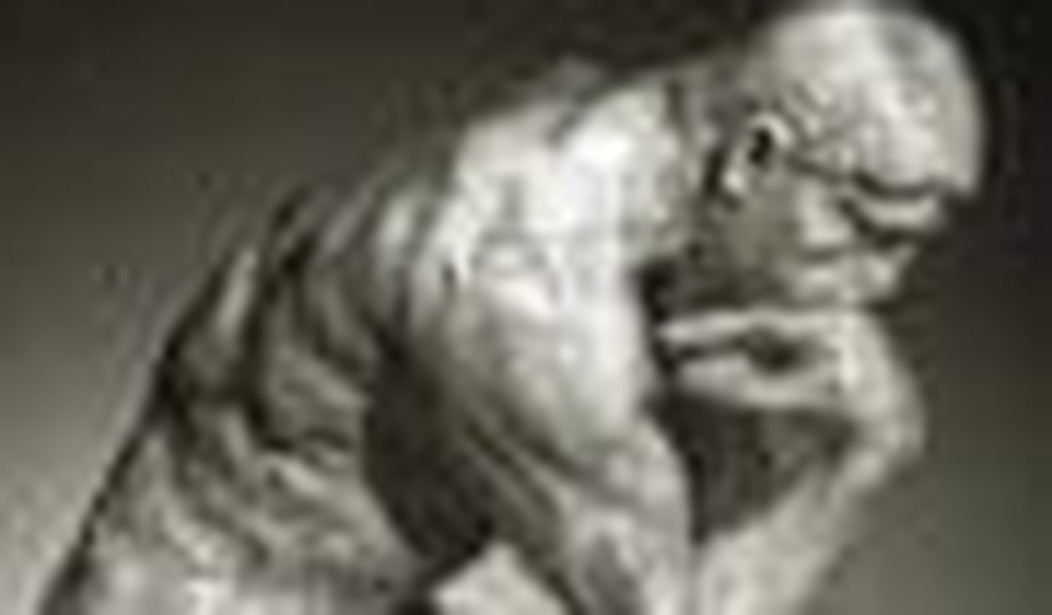“Yeah, it is that simple. He lied, and we all know it. So STFU. Now.” — Marecek
That was one of 1,643 comments left in response to Fred Hiatt’s June 9 piece in the Washington Post, entitled “Bush Lied? If Only It Were That Simple,” which covered the findings of the Select Committee on Intelligence, headed by Senator John D. Rockefeller IV (D-WV).
Marecek’s was the majority opinion.
In writing his piece for the editorial page of the Washington Post, Hiatt — that page’s editor — made the mistake of actually quoting passages of this report, which claimed that a host of “lies” of which President Bush has been accused since 2003 were “substantiated by intelligence.”
Vituperation and ad hominem attacks were left as commentary at the paper’s website, with calls for Hiatt’s immediate firing, for — apparently — his treason in quoting a report, written by a Democratic majority, that dared to depart from a narrative that has become conventional wisdom.
You know? The more I think about this lying idiot that edits WaPo, the more I realize how venal and corrupt the neo-cons really are. They really have no shame. No shame at all. Their corruption is complete. Frankly, the Emperor in Star Wars had more integrity than these neo-cons. Hiatt truly is a lapdog. — santafe2
I showed the article and comments to several friends of various backgrounds. One who works in media shot back: “if you don’t like the message, ignore it and kill the messenger!”
A friend who homeschools her children — and does it so well that the oldest has won a full academic scholarship to a university — was surprised that commenters would express such contempt not for the committee findings, which contradicted their worldview, but for the reporter who covered it. “It’s illogical,” she said. “Do public schools no longer teach critical thinking skills?”
Curious about that myself, I asked a friend who teaches social studies at a local and very well-regarded high school. “We’re supposed to be teaching critical thinking,” she said. “It’s in all the local and state standards, but in practice … there’s only so much time.”
“I really do try to tell my students to keep an open mind and consider all sides,” she continued, “but how much effect do you think that has when they get their news from sound bites followed by sarcasm on Comedy Central, and they see teachers wearing ‘Bush Lied’ buttons on their lapels? The button gives a cue: ‘Think this way, you’ll get an A.’ That’s pretty alluring. There is nothing out there actively encouraging reasonable thought; we do not teach logic.”
A quick poll of college freshmen around the house found little to disagree with in her assessment. “Mr. B. did make a point of telling us to listen to both sides and make up our own minds, but mostly you knew where a teacher stood politically, because even if they tried not to show it, you could see it in how they taught — how they’d talk up what they supported and barely mention the other side.”
I showed them the Hiatt piece and comments, and asked their thoughts. “Well, you know,” one young man shrugged, “it doesn’t really matter. It’s gone beyond what’s true or not anymore. People are going to believe what they want to believe.”
Hiatt himself suggested as much, writing:
Why does it matter, at this late date? The Rockefeller report will not cause a spike in “Bush Lied” mug sales, and the Bond dissent will not lead anyone to scrape the “Bush Lied” bumper sticker off his or her car.
“It doesn’t matter,” the young man, repeated. “People don’t look at ‘the truth’ as ‘the truth’ anymore. There’s just what you believe, and how the other guy is wrong.”
“But that describes feelings, not truth,” I said.
“Right. Your feelings are your truth.”
“When did this happen?” I asked, “because I didn’t get the memo.”
My son gave a wry laugh and piped in, “around the time we couldn’t decide what the meaning of ‘is’ was!”
Laughter all around, but I could not join in. Collecting their news and information from Comedy Central and internet forums rich with satire and irony, everything has become a joke for our young — the “truthiness” that “feels” right, an acceptable alternative to solid facts or findings. But clever jokes and easy cynicism will not right the wrongs of the world or encourage serious governance over the cartoonish politics of the day.
“Do you know Pope Benedict?” I asked the group. “Gunter Grass told a story about the pope when he was a teenager named Joseph Ratzinger and they were in an American POW camp.”
“Right, he was a Nazi,” a girl piped up, knowledgeably, “but everyone was conscripted, then.”
With a low moan I decided to let that bare bones narrative suffice. “Grass related a conversation he had with Ratzinger in that camp. ‘There are many truths,’ he said. And Ratzinger replied, ‘there is only one.'”
“Well, that’s why he’s pope,” my son said, breezing it along. “Seems like ‘truthiness’ has been around for a while then,” he added.
“Relativism has been, anyway,” I agreed, knowing they’d lost interest. When they left I took out Benedict XVI’s last homily as Cardinal Ratzinger, and reread this:
How many winds of doctrine we have known in these last decades, how many ideological currents, how many fashions of thought. …
While relativism, that is, allowing oneself to be carried about with every wind of “doctrine,” seems to be the only attitude that is fashionable. A dictatorship of relativism is being constituted that recognizes nothing as absolute and which only leaves the “I” and its whims as the ultimate measure.
Which explains, perhaps, how logic is served when a writer simply reports the facts of a finding and is met with: “STFU. Now.”









Join the conversation as a VIP Member